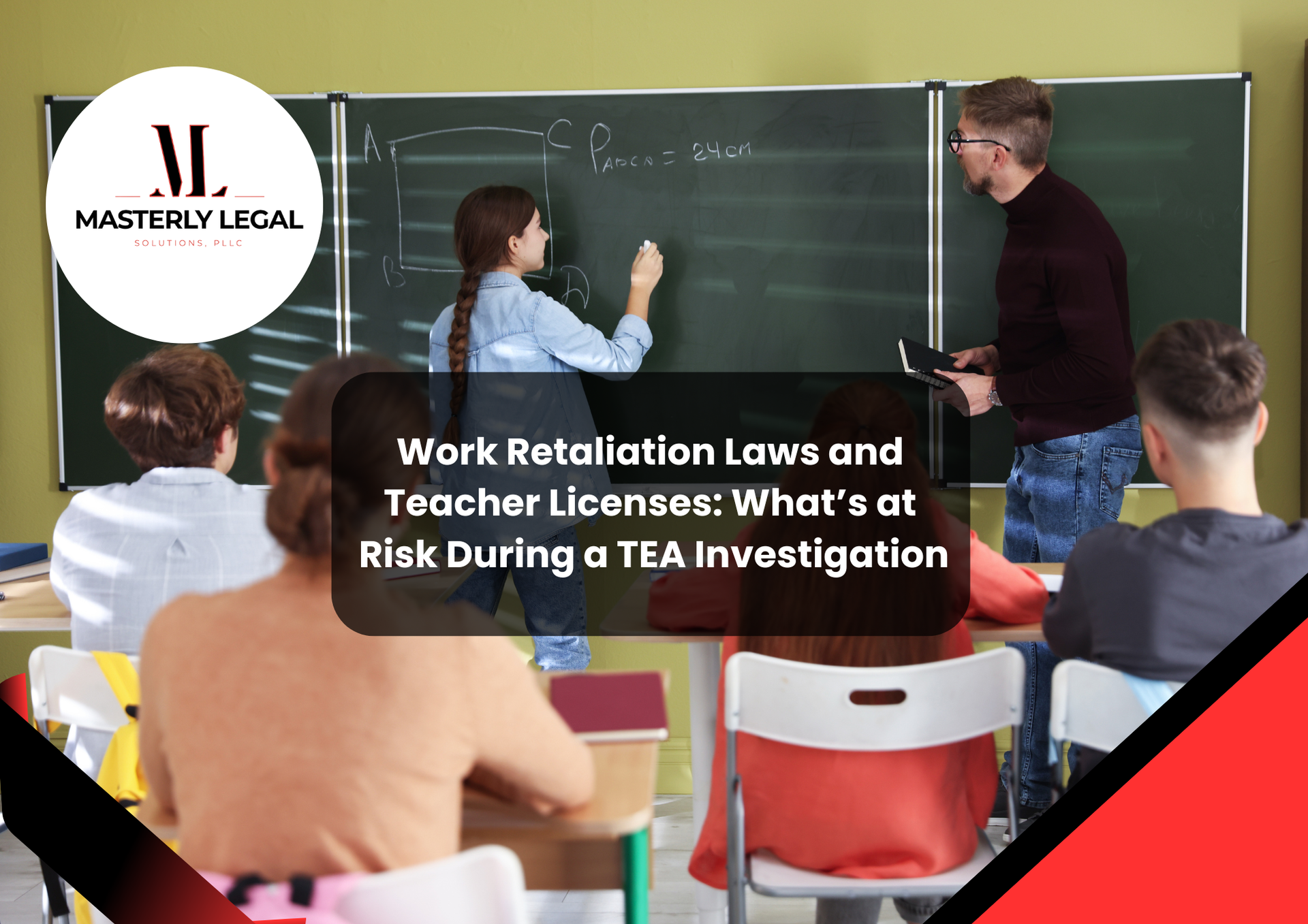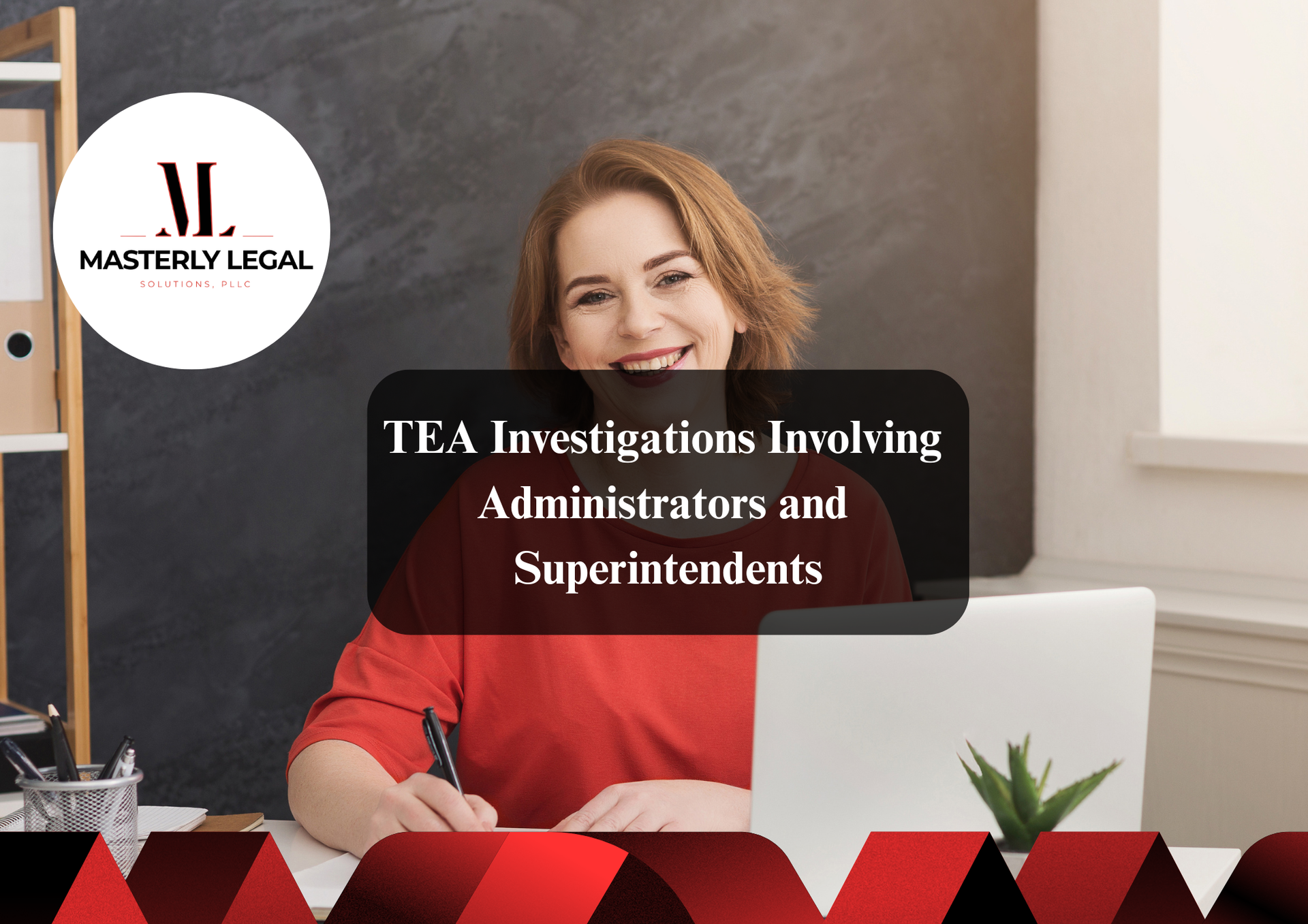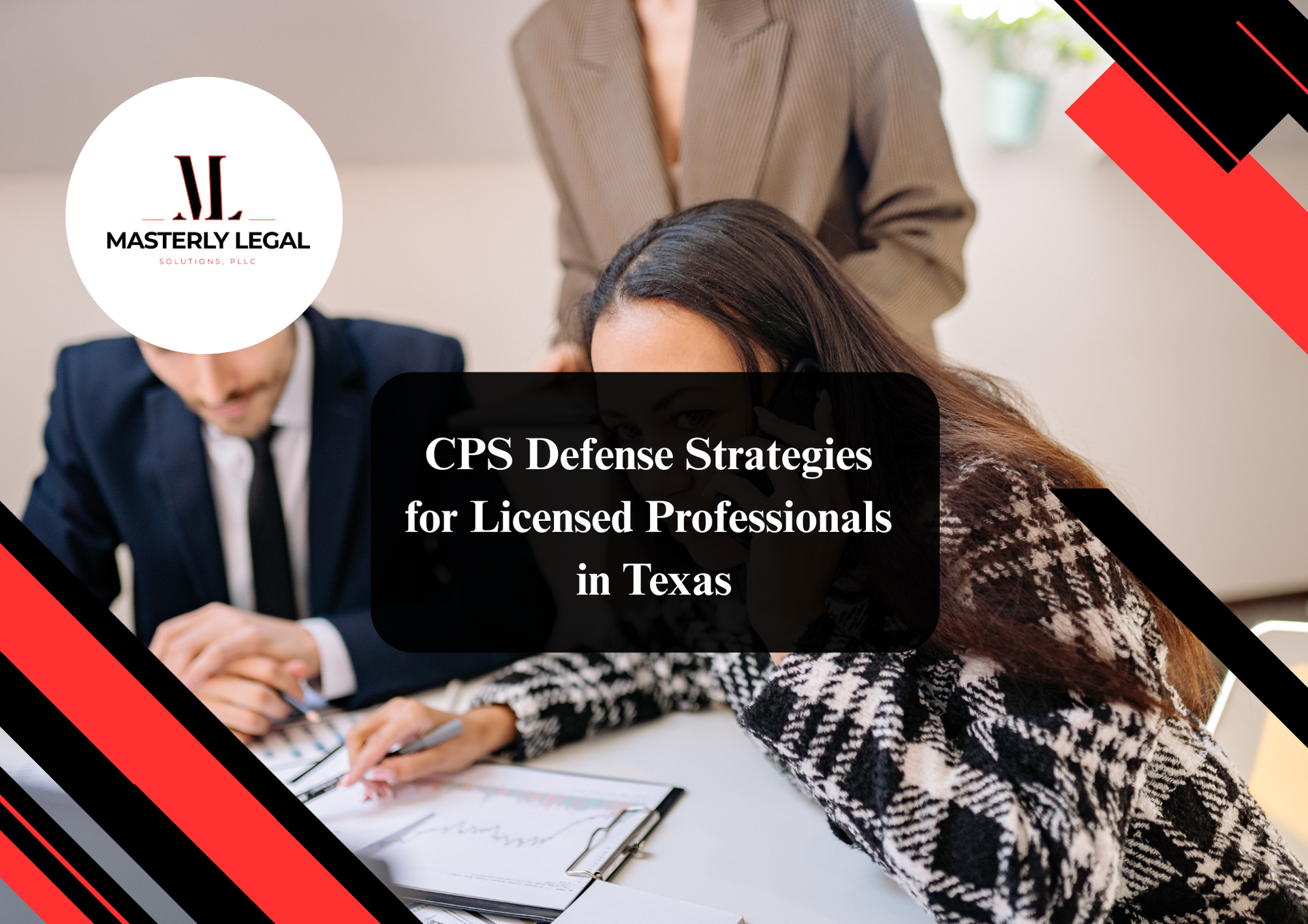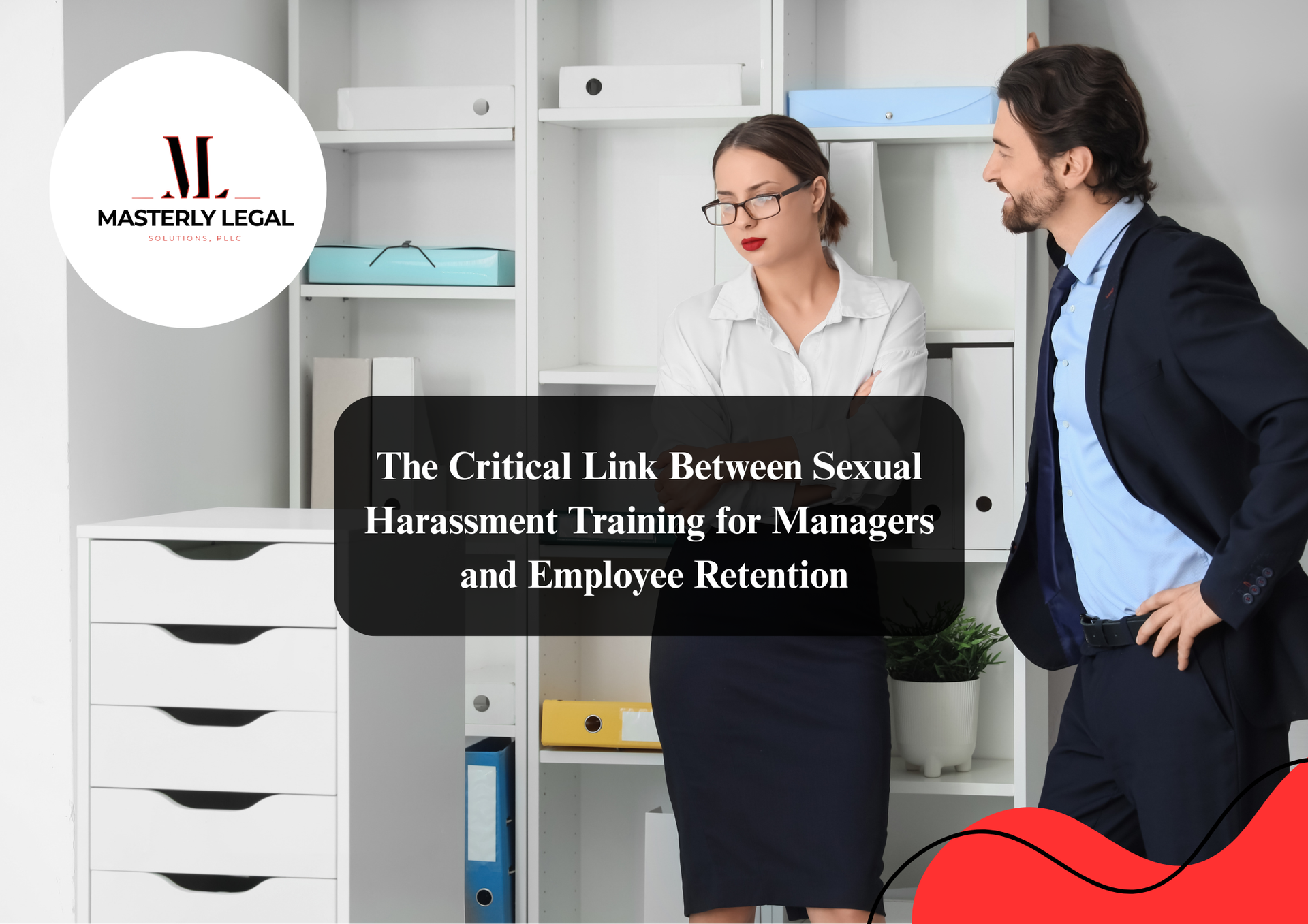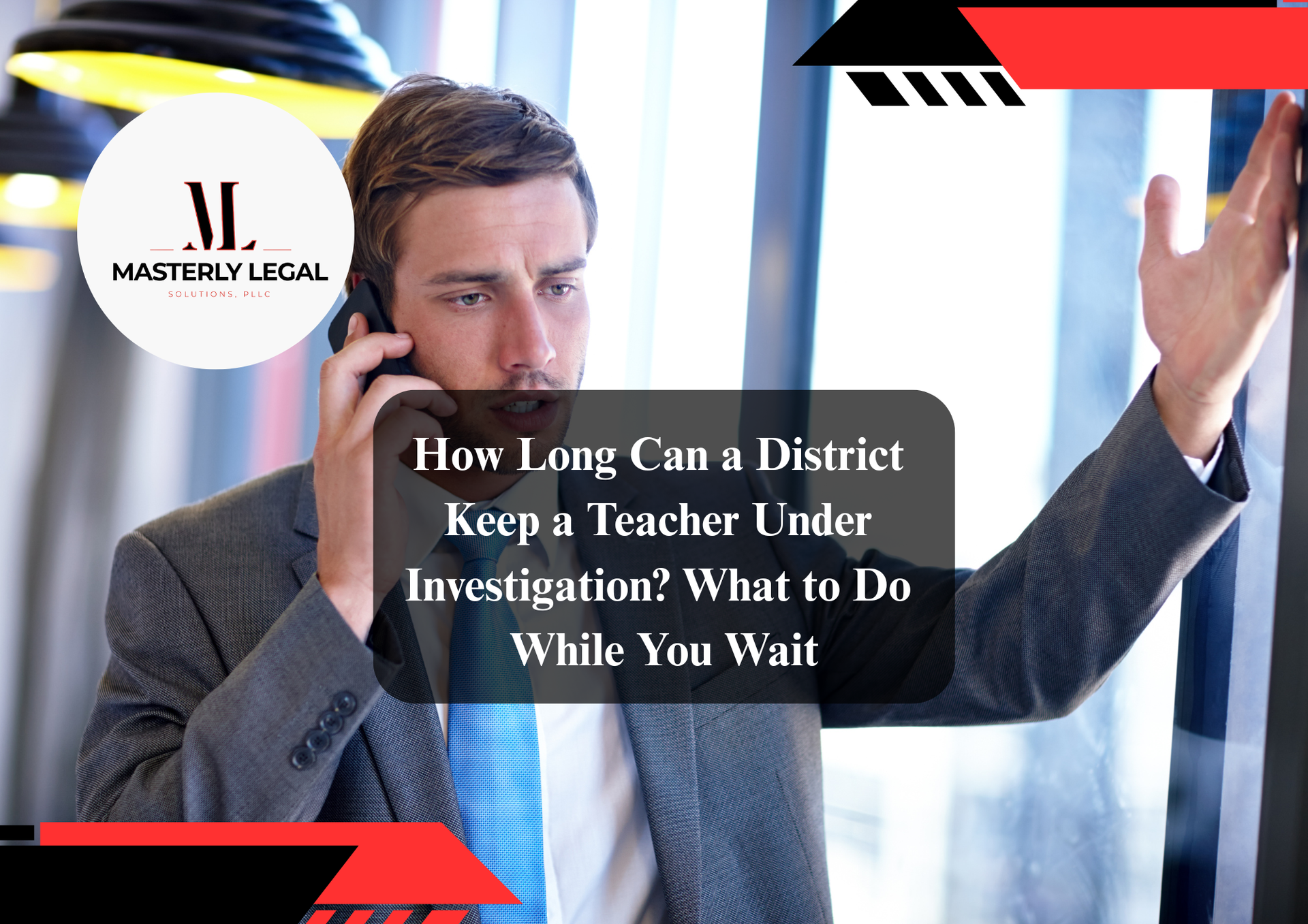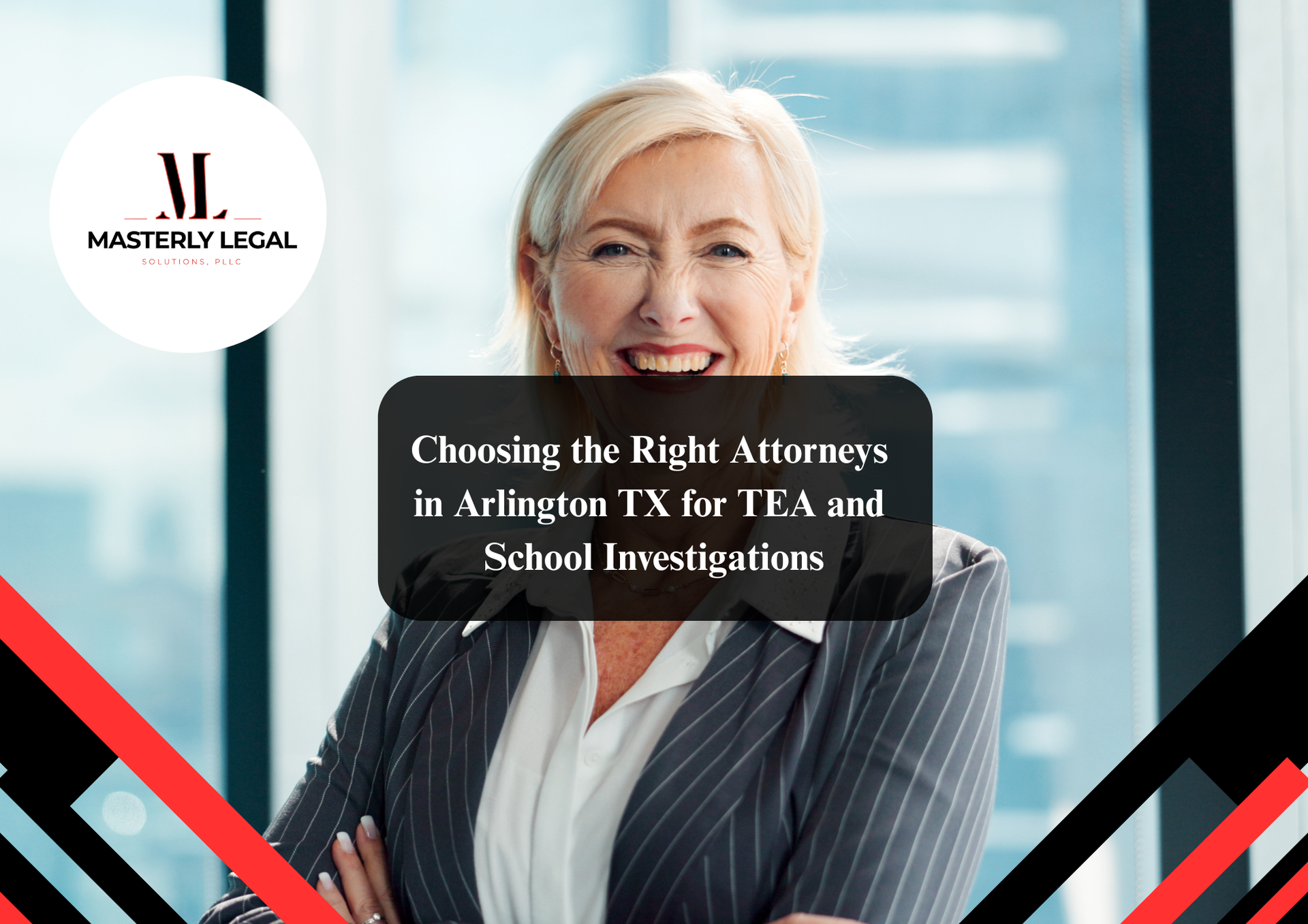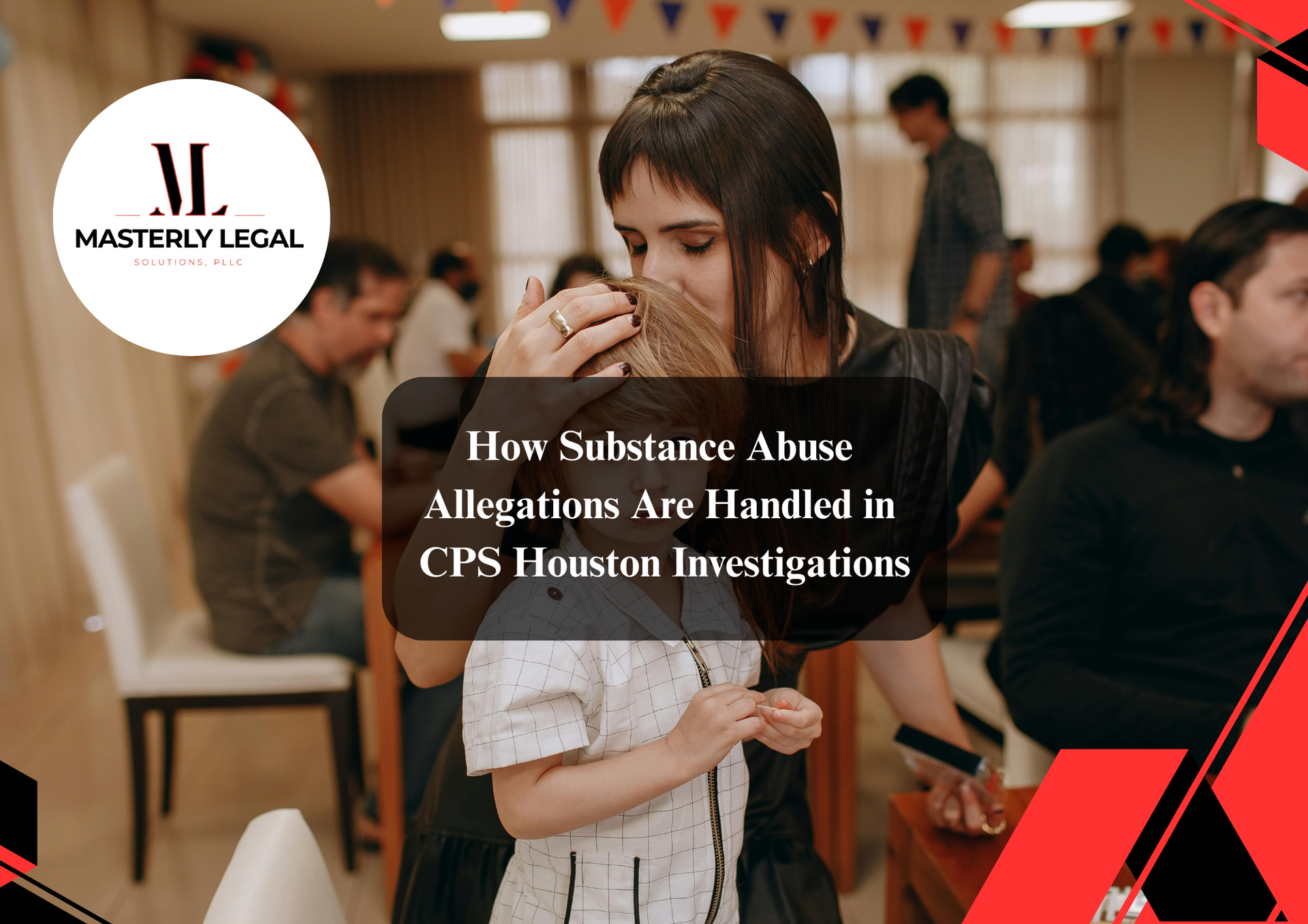The Ultimate Guide to TEA Misconduct Investigations: Rights, Risks & Outcomes
Educators enter the profession because they believe in students, public education, and creating safe places for learning. Yet when a TEA misconduct investigation begins, even the best teachers and administrators can feel overwhelmed. This guide breaks down how education law protects your rights, what risks you face, and what real outcomes look like when a school lawyer or education law attorney steps in. If you work in a school, college, charter school, or any educational institution, this is a must-read for understanding how to protect your license, your career, and your future.
A TEA investigation can feel personal, frightening, and deeply unfair. But you are not powerless. Knowing the law, understanding your due process rights, and getting legal representation early can change everything. This article provides clear guidance that is easy to understand, even if you're not familiar with litigation, federal laws, or the education code. It’s worth reading because your career and reputation deserve protection from day one.
Understanding How Education Law Shapes TEA Investigations
Education law plays a major role in how teacher misconduct cases unfold. The law affects public and private schools, higher education, and community college districts. It governs student discipline issues, title ix regulations, and even special education concerns like IEP compliance or FAPE requirements. For educators, the law determines how complaints are filed, how investigations proceed, and how employment decisions are made.
When an administrator reports alleged misconduct, the department of education and TEA use state and federal laws to determine next steps. These legal matters can involve disability issues, public education funding rules, and civil rights protections. Education attorneys understand how these laws apply and use their expertise to protect teachers in K-12 school environments, charter campuses, and colleges and universities.
Because litigation can escalate quickly into federal court or state and federal courts, educators should never navigate these processes alone. A school lawyer or education law attorney can help you exercise your right to fair treatment under state and federal laws while guiding you through complex procedures.
What Triggers a TEA Educator Misconduct Investigation?
A TEA investigation may begin for many reasons, some small and others serious. Understanding the triggers helps educators stay prepared and avoid surprises. Often, an investigation starts with a complaint from a school district, a school board, or an administrator who is required to report alleged misconduct.
Common triggers include:
- Allegations related to student discipline or classroom management
- Accusations of violating district policies or education code
- Concerns involving title ix compliance or retaliation claims
- Issues surrounding employment contracts or tenure
- Claims related to special education services or FAPE disputes
Public and private schools have mandatory reporting duties, even when allegations are unfounded. Attorneys advise educators not to assume a complaint will disappear on its own because once the law firm representing the district files a report, TEA must investigate. School administrators, board members, and school boards association guidelines often require action even when evidence is unclear.
Your Rights During a TEA Investigation and Why They Matter
Many teachers believe they have no rights during a TEA investigation, but education law gives you important protections. Due process ensures you are treated fairly whether you work in a K-12 school, charter school, community college, or higher education institution. Even nonprofit educational institutions must follow the same requirements.
Your rights include the right to:
- Receive notice of the allegations
- Respond to claims with evidence
- Obtain legal representation from an education law attorney
- Present witnesses and documentation
- Appeal negative findings through the court of appeals or other appellate procedures
These rights are critical because investigations can result in serious consequences such as license suspension, employment termination, or placement on the Do Not Hire registry. Education lawyers and attorneys provide guidance at every step, helping educators avoid damaging mistakes and protect their future.
Why Educators Should Never Face TEA Without a School Lawyer
A misconduct investigation is not a simple HR issue. It is a legal matter with real risks. A lawyer who understands school law, special education regulations, and litigation procedures is essential to protecting your career. Education attorneys know how TEA investigators operate, what evidence matters, and how the law protects teachers from unfair treatment.
Many educators try to handle interviews alone, thinking the truth will speak for itself. But investigators are not advocates—they are fact-finders. Anything said can be misunderstood, misinterpreted, or misrecorded. With a school lawyer present, educators stay protected while ensuring their statements remain consistent with legal strategy.
The stakes are too high to go alone. One incorrect answer or one missing document can change your entire career. That is why legal representation from a law firm familiar with public and private schools, community college districts, and charter campuses is vital.
How TEA Investigations Affect Employment and Teacher Credentials
When TEA begins an investigation, employment consequences often follow. A teacher or administrator may be placed on leave, reassigned, or required to complete corrective actions. Because employment law intersects with education law, school districts must follow state and federal laws while protecting their own interests.
Possible outcomes include:
- Administrative leave during the investigation
- Termination or non-renewal of employment contracts
- Loss of tenure protections
- Required professional development or corrective documentation
- Referral for litigation or court involvement
The most serious outcomes affect your license. TEA can suspend, revoke, or permanently deny an educator’s license, even if the school district does not take action. This is why attorneys provide immediate support to prevent long-term consequences.
What Legal Issues Are Most Common in TEA Investigations?
Education law covers an extensive range of legal issues, and many arise during misconduct investigations. Some of the most frequent include civil rights concerns, disability law compliance, and allegations of violating education code provisions.
Here are the most common problem areas:
- Student discipline disputes
- Title IX sexual misconduct allegations
- Disability or special education conflicts involving IEP rules
- Claims of retaliation
- Employment contract violations
- Collective bargaining disputes
- Governance or board policy violations
These areas involve complex regulations that require guidance from an education law attorney who understands how school boards and administrators interpret legal matters. Attorneys understand the unique legal challenges educators face and help avoid mistakes that could lead to federal district or federal court involvement.
How Evidence Works in TEA Investigations and Why It Matters
Evidence is the core of every TEA investigation. Whether you teach in a k-12 school, a charter school, a community college, or a public university, the same rules apply. Evidence can include emails, witness statements, classroom recordings, or documentation from student discipline incidents.
Educators often underestimate the importance of preserving evidence. For example, deleting emails or messages—even accidentally—can create problems. A school lawyer helps gather evidence legally and ethically, ensuring compliance with state and federal laws.
Evidence can protect you, especially when accusations are false or exaggerated. With proper legal services, educators can demonstrate they followed district policies, provided appropriate supervision, or complied with special education guidelines such as FAPE or IEP requirements.
What Happens After TEA Reaches a Decision?
Once TEA completes its review, several things may happen. Educators may receive a letter clearing them of wrongdoing, or TEA may issue recommended sanctions. Under education law, teachers and administrators have the right to challenge findings through appeal procedures.
Possible outcomes include:
- Case closed with no action
- Formal reprimand or written warning
- Suspension of license
- Revocation of license
- Referral to the court of appeals or federal district courts
- Employment consequences imposed by the school district
Because decisions can permanently impact your ability to teach, attorneys advise educators to respond carefully. A school lawyer can file an appeal, negotiate with investigators, or pursue litigation if necessary.
The Role of a Law Firm in Protecting Educators and School Administrators
A law firm specializing in education law serves as the defender, counselor, and advocate for educators. Whether you are in near Houston, throughout California, or anywhere else, legal services remain critical because education law applies across states. Education attorneys use their experience to manage investigation strategy, communication with TEA, and interactions with administrators and school boards.
Lawyers with experience in litigation can appear in court, federal district hearings, or appellate matters when necessary. They also help educators understand the risks associated with employment decisions, charter school rules, or nonprofit institutions’ unique policies.
Attorneys provide clarity for educators who feel lost in legal jargon. They ensure compliance with federal laws such as Title IX, the Clery Act, and equal access regulations, protecting educators from unfair treatment.
How Special Education Issues Affect TEA Investigations
Special education is one of the most heavily regulated areas in all of public education. Missteps can trigger TEA investigations, especially when allegations involve disability rights, FAPE compliance, or IEP requirements.
Teachers and administrators working in special education face unique legal responsibilities, including:
- Documenting progress accurately
- Following IEP guidelines
- Ensuring equal access to services
- Complying with the education code and federal laws
Because these cases often involve parents, school districts, and state agencies, a school lawyer or specialist in education law becomes essential for navigating conflicts. Legal representation protects educators from claims that may be the result of miscommunication rather than misconduct.
How COVID-19 Changed TEA Investigations and Education Law
COVID-19 disrupted nearly every part of the school system, including how investigations unfold. Remote learning created new challenges in classroom management, student discipline, and compliance with educational standards.
Virtual instruction raised concerns involving:
- Online supervision
- Digital misconduct allegations
- Special education service interruptions
- Title IX and student discipline investigations conducted remotely
Education lawyers saw a rise in complaints triggered by misunderstandings in online settings. The law also expanded in areas related to online FAPE requirements, community college remote services, and higher education institutions adapting policies.
Real Outcomes: What Educators Can Expect
Although every TEA case is different, patterns exist. Real outcomes depend on the evidence, the law, and how early educators get legal help. Some educators are cleared after providing explanations, while others face sanctions because they responded late or without a school lawyer.
Possible realistic outcomes include:
- Complete dismissal of allegations
- Required corrective training
- Employment action but no license impact
- Temporary license suspension
- Permanent revocation of credentials
The outcome often depends on whether educators worked with a law firm early enough. Attorneys understand how TEA evaluates evidence and how to negotiate outcomes that protect careers.
How Education Law Protects Against Retaliation
Retaliation is a real concern for many teachers, especially in politically active school districts or charter environments. Education law includes protections preventing administrators from using investigations as tools of punishment.
Educators protected under civil rights laws or state and federal laws cannot be disciplined for reporting issues, raising concerns, or advocating for special education students. A school lawyer ensures retaliation claims are documented properly and addressed legally.
The Importance of Seeing TEA Investigations Through to the End
Some educators feel tempted to resign, switch to private universities, or leave public education entirely. But resignation can harm your case. TEA may continue its investigation even if you leave your position.
Seeing the investigation through protects:
- Your license
- Your employment history
- Your eligibility to work in public and private schools
- Your reputation across colleges and universities
Legal representation helps educators stay strong through the process and avoid decisions that trigger negative long-term consequences.
What School Boards and Administrators Consider in TEA Cases
School boards and administrators must comply with governance rules, education code requirements, and state and federal laws. Their decisions often shape TEA investigations, especially when they are required to self-report.
Factors they consider include:
- District liability risks
- Public relations concerns
- Compliance rules
- Community expectations
- State and federal reporting obligations
A law firm advocating for educators helps counterbalance these institutional interests.
How Legal Matters Escalate From a TEA Case to Court
Some cases escalate into litigation when educators and TEA cannot reach agreement. These cases may move into federal court, appellate review, or the court of appeals. A litigator with education law experience is necessary for these complex battles.
Education lawyers represent teachers in federal district matters, collective bargaining issues, tenure disputes, and retaliation claims. These legal matters require deep knowledge of school law and strict compliance requirements.
The Role of Charter Schools and Community Colleges in Misconduct Reporting
Charter schools and community college districts follow different governance structures, but they must still comply with state and federal laws. This creates challenges for teachers who may not fully understand the differences between traditional school boards and charter networks.
Charter campuses sometimes report more aggressively due to unique legal and nonprofit requirements. Community college administrators often follow higher education rules or postsecondary policies that differ from K-12 processes.
Why Education Attorneys Are Essential for Protecting Your Career
Education attorneys are specialists trained to manage legal issues unique to public and private schools. They provide guidance on compliance, equal access rules, and how to navigate investigations with confidence. Attorneys understand how teacher and administrator roles intersect with law, policy, and governance.
Education attorneys protect:
- Teacher licenses
- Employment rights
- Reputation across educational institutions
- Compliance with state and federal laws
Without skilled counsel, educators risk outcomes that could have been avoided entirely.
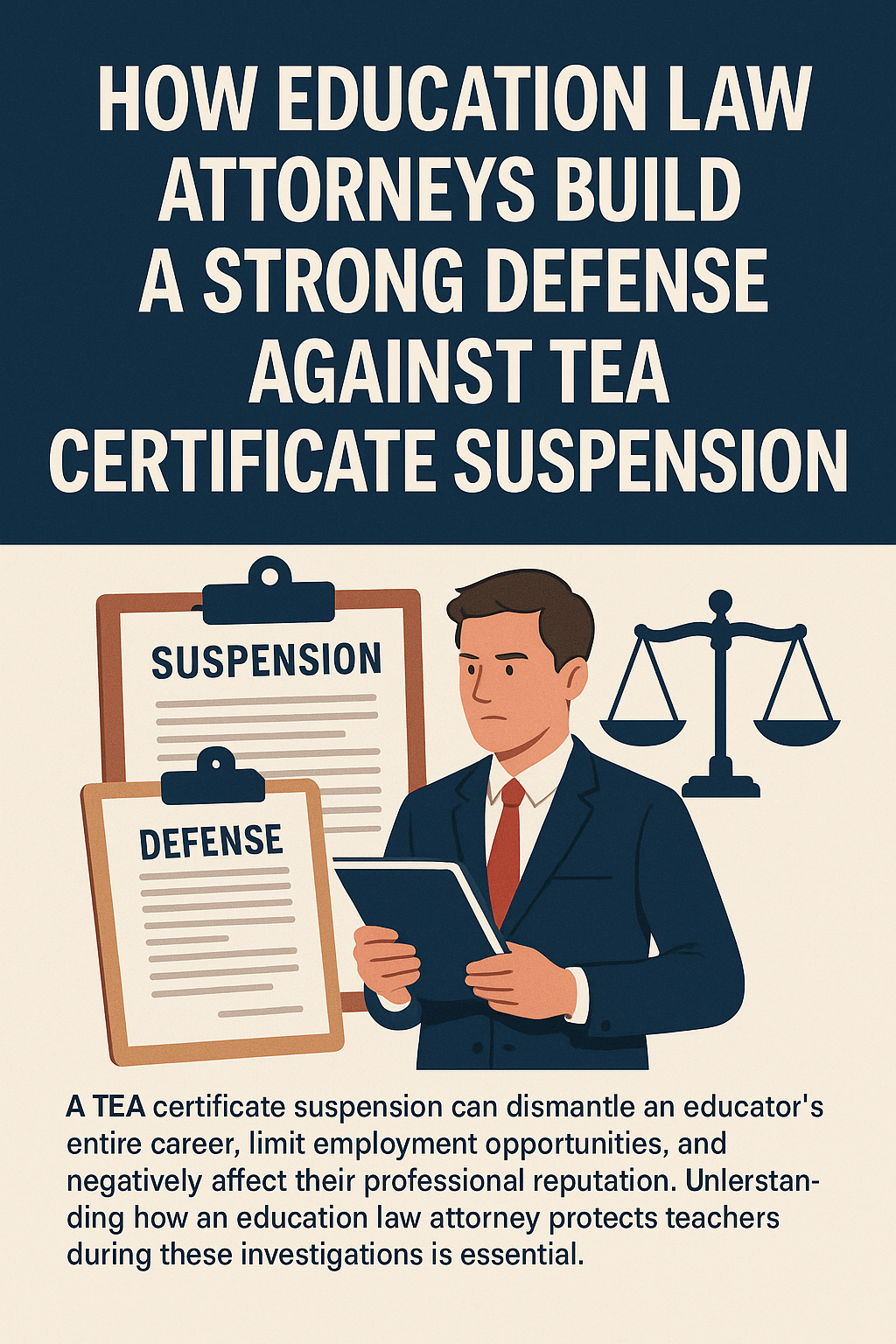
Summary of Key Points
- TEA investigations can drastically affect your employment and professional license.
- Educators have strong rights, including due process and legal representation.
- Misconduct cases often involve misunderstandings or procedural errors—not intentional wrongdoing.
- An experienced education law professional can protect your career at every stage.
- Charter, school, and college employees all face similar TEA obligations.
- Early legal involvement results in better outcomes and fewer long-term consequences.
Speak With Masterly Legal Solutions for Immediate Help
When your career, reputation, and future in education are on the line, you deserve an advocate who understands the stakes. At Masterly Legal Solutions, our team of skilled education law professionals provides strategic defense, detailed case preparation, and aggressive protection of your rights. We help teachers, administrators, and staff navigate the complexities of TEA investigations with clarity and confidence. If you're facing allegations—or simply have questions—reach out today.
Contact us at (972) 236-5051 for a free consultation, and let us help protect your future in education.
This article is for educational purposes only and does not constitute legal advice.
Looking for Legal & Business Solutions? Contact Us Now
Fill in the form or call us to set up a meeting

